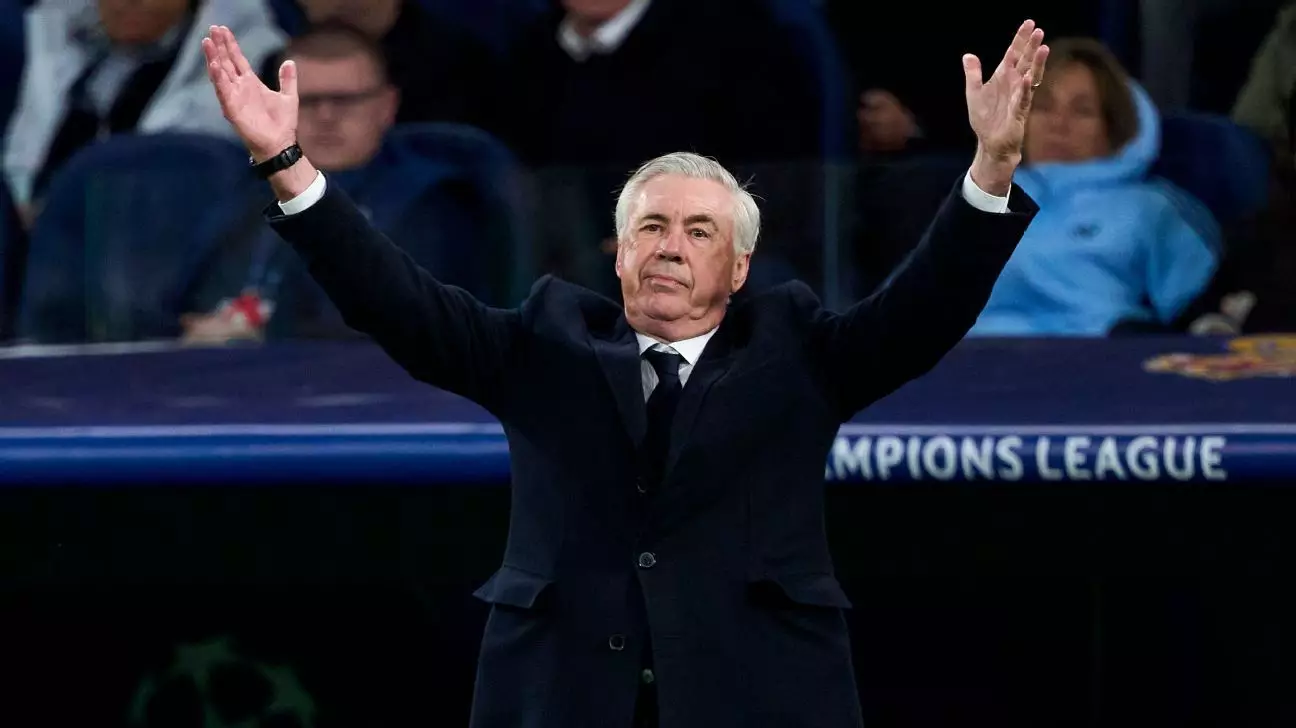Real Madrid, a club synonymous with a rich history of success, finds itself at a crucial juncture following the recent 2-1 defeat to Arsenal in the Champions League quarterfinals. This result not only eliminated the reigning champions but also cast a shadow over the future of head coach Carlo Ancelotti, who has yet to comment definitively on whether he will continue with the team. Already, the weight of the club’s storied legacy strains the shoulders of its management and players as they grapple with the realities of a lackluster season. With lofty expectations and a formidable roster, the question looms large: how could such a historically dominant team stumble at this pivotal moment?
Ancelotti’s dilemma is not just tactical; it is existential. His comments following the match, where he expressed uncertainty about his future, mirror the discontent that has permeated through the fanbase and pundits alike. Finding themselves eliminated after a poor showing, wherein they were outclassed over two legs, raises the stakes even higher. This situation begs a deeper inquiry into whether tactical choices, player performance, or something more systemic is at play in the team’s failures.
The Importance of Chemistry Over Individual Talent
Thibaut Courtois, Real Madrid’s stalwart goalkeeper, articulated a powerful notion that encapsulates the disconnect within the squad. Referring to the need for more collective effort rather than depending on individual brilliance, he underscored a fundamental issue: effective synergy is the backbone of successful football. While star players like Vinícius Júnior and Kylian Mbappé often shine brightly on an individual level, football is ultimately a team game. The failure to collaborate as a cohesive unit can thwart even the most talented roster’s ambitions, revealing that raw skill does not always translate into victory.
The absence of a ‘natural center forward’ further complicated Madrid’s attacking dynamic, as Courtois lamented the departure of Joselu—a player who was adept at converting opportunities into goals. In high-stakes matches like those in the Champions League, tactical versatility and sharp execution in the final third are non-negotiable. Without a focal point to pivot their attack around, Real Madrid found their forward movement stymied against an organized Arsenal defense that effectively nullified their threats.
A Moment of Reflection for Leadership
The reality of their premature exit prompts necessary reflection on Ancelotti’s leadership style and methods. A champion coach, Ancelotti has understandably carved a place in football history, yet questions about his efficacy in navigating modern football’s demands persist. His admission that the team lacked collective attitude compared to previous seasons suggests that a different approach may be required to rejuvenate a squad that has sometimes appeared disjointed or uninspired.
In moments when the tide of the game shifts, as it did with the disallowed penalty, tactical acumen can be the difference between triumph and despair. Ancelotti’s views on potential turning points illustrate that while outside influences, such as officiating, can impact outcomes, the onus remains on the coaching staff to ensure players are adequately prepared to seize such opportunities. The importance of adaptability in coaching has never been more critical than in today’s frenetic football landscape, where momentum can turn on a dime.
Unraveling the Fabric of Success
As the team prepares for its upcoming matches in LaLiga and the Copa del Rey final against Barcelona, the urgent need for introspection looms heavy. What must also be addressed is the intangible aspect of team identity—what does it mean to wear the iconic white jersey of Real Madrid? The echoes of past legends and their unmatched spirit act as a looming benchmark for current players and staff. Real Madrid’s current roster continues to grapple with this incredible burden, navigating both high expectations and the scrutiny that accompanies every misstep.
Moving forward, the club must also evaluate potential reinforcements to the squad. This analysis is twofold: bolstering personnel and reshaping the philosophy of play to best capitalize on existing talent. If change is on the horizon—which Ancelotti himself hints could be the case—then the time to act is now. Unquestionably, changes in management, tactics, or player personnel can both energize the fanbase and restore confidence among players.
Ultimately, Real Madrid stands at a crossroads, with a legacy to maintain and the pressure of scrutiny intensifying. Embracing self-criticism and the willingness to evolve is essential for a club that aspires to once again conquer Europe. Only time will reveal whether they can transform this moment of loss into a foundation for future success, moving beyond mere survival to reestablish dominance on the world stage.

